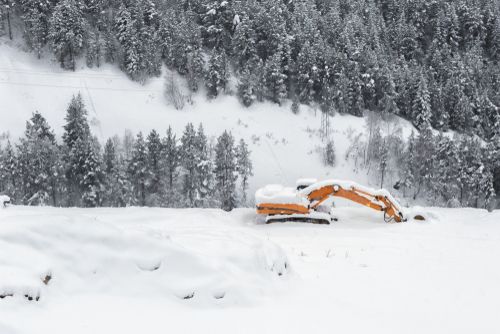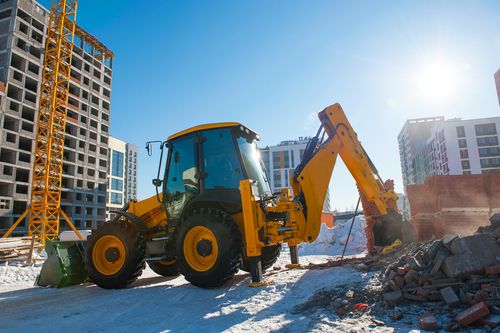Winter Equipment Inspections: Ensuring Material Handling Tools Are Winter-Ready
Businesses and industries from a wide range of sectors need winter equipment inspections to prepare their material handling instruments for the harsh and demanding circumstances that come with the season as winter draws near. Whether you run a warehouse, a building site, or a logistics centre, it is crucial to make sure your equipment is prepared for winter.
In this blog, the team at Advanced CT examines the vital components of winter equipment inspections and discusses how careful planning can make a world of difference when it snows and the temperature drops.
Review Manufacturer Guidelines

It’s crucial to begin by carefully reading the instructions provided by the manufacturer for each piece of equipment. These recommendations frequently provide detailed instructions for winterizing equipment. They could suggest certain upkeep methods, fluid varieties, and other crucial considerations.
Inspect Fluids
Keep a watchful eye on the fluids in your machinery. Check the levels of the coolant, hydraulic fluid, and engine oil. Make sure they are at the appropriate levels as stated in the manufacturer’s instructions. Additionally, confirm that these fluids are suitable for use in cold climates. Consider using winter-grade fluids to avoid freezing or thickening in excessively cold conditions.
Battery Maintenance
Batteries may be more strained during cold temperatures. Check the batteries for any corrosion on the connections, wires, or terminals. Verify the charge level to make sure it falls within the manufacturer’s suggested range. To preserve maximum battery performance in areas with severe winters, think about adding insulation or battery warmers.
Tire Examination
Tire condition is essential for safe winter operation. Check the tires for damage and wear, and make sure the tread depth is adequate. Consider converting to winter tires with increased grip in snowy or icy weather. Tire chains may help your machine have better traction on slick areas, if necessary.
Lubrication
To keep your equipment operating properly in cold weather, proper lubrication is essential. To lubricate all moving components, adhere to the manufacturer’s instructions. Use the proper kind of lubrication for winter situations since low temperatures can cause lubricants to thicken.
Heating Systems
The efficiency of your equipment’s heating system is crucial during the winter if it houses a cabin or other enclosed place for the operators. Check to see if the heating system is functioning properly. Make sure it offers enough warmth for the operator’s safety and comfort, especially if they are operating in a cold environment.
Electrical Systems
It’s crucial to thoroughly assess the electrical systems while inspecting winter equipment. Check the condition of all the electrical parts, including the heaters, defrosters, and lights. Verify the integrity of the wiring and the security of all connections. In cold weather, malfunctioning electrical systems can cause reduced visibility and safety risks.
Safety Features
Check the operation of the safety measures on your material handling equipment. This includes inspecting the brakes, alarms, and emergency shutoffs. Make sure that these safety features are functioning properly because cold weather might make accidents more likely. A well-maintained safety system is essential for the protection of the operator.
Snow and Ice Removal Equipment
Any specialist machinery, such as plows, snowblowers, or salt spreaders, must be inspected and tested if your material handling items are utilized for snow and ice removal. In order to effectively remove snow and ice from your building or site during inclement weather, make sure these attachments are in good operating order.
Operator Training

The preparation of winter equipment must include operator training. Make sure that all of your equipment operators are knowledgeable of the unique difficulties that come with operating in the winter. To keep them secure and at ease while working the machinery, provide them with cold-weather gear like insulated clothes and gloves.
Emergency Supplies
Equip your material handling tools with emergency supplies in case of impending winter storms or cold-weather equipment failures. These supplies may contain food, water, blankets, and other necessities that can keep operators alive in the event that they become stuck during severe winter weather. Operator safety depends on being ready for crises.
Documentation
Keep thorough records of all inspections and upkeep procedures carried out on your material handling equipment. It also allows for the monitoring of the equipment’s performance over time and compliance with safety laws. It may be quite useful for future planning and maintenance.
Advanced CT – Leaders in Occupational Health & Safety
Winter equipment inspections are not only a typical checklist but an essential strategy for enterprises and sectors working in cold climates. You can make sure that your material handling instruments are both safe and effective as well as winter-ready by taking the time to do these checks. This proactive strategy not only reduces unplanned downtime but also improves operator comfort and safety during operations in cold weather. Take the time to set up your equipment for the difficulties ahead when the temperatures drop and snowflakes begin to fall. Even in the hardest winter circumstances, a strong winter preparation strategy, beginning with rigorous inspections, may keep your operations running smoothly.
Please contact us if you need help preparing your material handling tools for winter. At Advanced CT, we recognize the value of winter equipment inspections in keeping a workplace safe and productive throughout the chilly months. Don’t rely on chance while preparing your material handling instruments. Act now to protect your business against the difficulties of winter. To arrange for thorough winter equipment inspections and operator training, get in touch with Advanced CT, your go-to partner in health and safety training. Our specialists will guide you through the challenges of winter preparedness and make sure your equipment is up to the job. Don’t let winter catch you off guard. Reach out to us right away and enjoy the security that comes with knowing that your material handling equipment is prepared for the winter.

